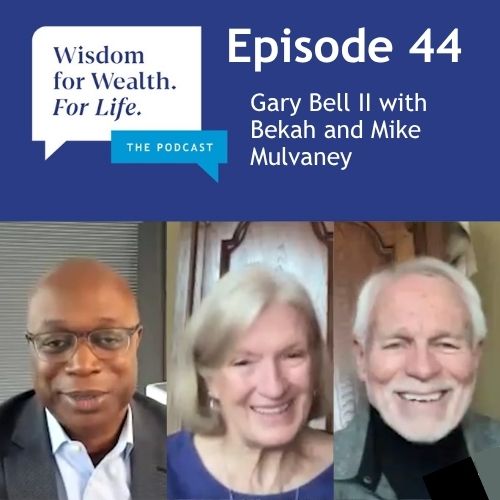“Wisdom for Wealth. For Life.” Episode 44: How to Know Where to Give
For many families, the question isn’t whether to give—it’s where to give. With countless worthy causes and organizations seeking support, how do you determine where your charitable dollars will make the greatest impact?
Bekah and Mike Mulvaney, long-time Blue Trust clients, have developed a thoughtful approach to determining the recipients of their charitable giving. Their journey offers valuable insights for anyone wondering how to choose where and how to give most effectively.
Stewardship over ownership
The Mulvaneys’ giving philosophy starts with a fundamental shift in perspective. “We don’t see our money, time, or energy as ours,” Bekah said. “It’s His. We are just a conduit, a hose through which the water flows.”
This stewardship mindset shaped the Mulvaneys’ approach from early in their marriage. Mike said, “We started tithing from our take-home salary. And after a short while, God convicted us to tithe on our total salary… and to increase that a percent or so as we went along.”
“Our goal was to ultimately be able to give away two or three times what we lived on,” Mike continued. This level of giving required the couple to live intentionally and make purposeful decisions as their income increased, avoiding lifestyle inflation that often accompanies financial success.
Principles for choosing where to give
Bekah and Mike have developed specific criteria for evaluating potential recipients of their charitable giving. Over the years, their priorities have shifted from supporting youth and teenagers in crisis to focusing primarily on unreached people groups around the world. They look for heart-driven causes, especially organizations that provide empowerment-focused ministries rather than pure relief efforts.
The Mulvaneys shared an example of supporting a homeless shelter that embodies the “teach to fish” philosophy. Beyond providing meals and beds, this ministry requires residents to maintain employment while automatically depositing all earnings into savings accounts. During their 90-day stay, residents receive budget counseling and parenting classes, participate in Bible studies, and work with social workers to find better job opportunities.
“By the end of the 90 days, [participants] have a nest egg to get into an apartment,” Mike said. “These people stay off the streets. They’re able to get a start.” The ministry has a 90% success rate in keeping people off the streets permanently.
Before committing significant resources, the couple thoroughly evaluates organizations through multiple lenses. Financial transparency is always key. “We look at their financials to see how much money they’re actually spending on ministry as opposed to administration and fundraising,” Bekah said. They also examine annual reports and track results over time to measure impact.
The couple’s approach includes starting small with new organizations. “We may start at a lower level and spend a year or two getting their newsletters and seeing their annual reports,” Bekah said. “Then we decide if we want to get more involved.”
A family culture of generosity
The Mulvaneys don’t just give as a couple. They established patterns of generosity early in their children’s lives, teaching them to allocate their allowances between giving, saving, and spending. This practice continued as the children grew and began earning their own money, creating lifelong habits around financial stewardship.
Now the Mulvaneys have adapted their approach for the next generation. When their now-grown children and grandchildren visit each summer, they conduct a family voting process where everyone shares causes close to their hearts. The democratic process gives each family member an equal voice and serves as an educational opportunity where the Mulvaneys share their approach to evaluating organizations.
“They’re thrilled to have a voice,” Bekah said. “We tell everybody to vote for their top three. If several things tie, we’ll give to more than one organization from that gift.”
Giving time and talent
Financial giving represents just one dimension of stewardship for the Mulvaneys. “The way we spend our money is the easy part,” Bekah said. “The spending of our time and energy for us is a bigger commitment and sacrifice.”
Since leaving Procter & Gamble at age 55, Mike has spent 18 years in full-time volunteer ministry, mentoring men and leading small groups. “I don’t believe in retirement,” he said. “I believe in redeployment.”
Bekah also found her calling in teaching and discipling others. She especially enjoys helping people discover their unique gifts for service. “When you find how you are uniquely designed with your passions, spiritual gifts, and personality, and you start serving Him in those ways, you’re energized by it,” she said.
Developing a legacy mindset
Mike and Bekah want to give during and after their lifetimes. Rather than leaving large inheritances, they’re giving to their children and grandchildren now, when the money can have the greatest impact.
“We came to the decision that our resources were given to us to steward, not given to us to give to our kids to steward,” Bekah said. Their estate plan directs the majority of remaining assets to ministry.
This decision required confidence that the next generation had sufficient resources for their own needs. Working with a financial advisor helped Bekah and Mike understand they had a significant surplus beyond what they needed to finish well, giving them freedom to be generous both now and through their legacy.
Where is God calling you to give?
The Mulvaneys’ journey demonstrates that effective giving requires more than good intentions. It demands clear values and priorities, rigorous evaluation of potential recipients, and integration into family culture. Success also requires balancing financial resources with personal involvement while maintaining a long-term perspective on impact.
As you consider your own giving strategy, ask yourself: Where is God calling me to give—not just financially, but with my whole life? The answer may reveal opportunities for impact you never considered.
If you would like to know more about how a Blue Trust advisor can help you with your charitable giving strategy or if you are interested in philanthropic consulting services, you can connect with us at 800.987.2987 or email blog@bluetrust.com.
Related Resources:
- Raising Generous Kids: 5 Summer Activities that Encourage Selflessness
- 5 Timeless Principles for Living a Meaningful and Purposeful Life
- A Plan for Purposeful Giving
In our “Wisdom for Wealth. For Life.” podcast series, we share financial advice and wisdom from our network of wealth advisors, thought leaders in the industry, and our community of over 11,000 financially blessed families who apply biblical wisdom to their financial planning and giving.
The podcast is available across most major podcast networks. If you enjoy this episode, please consider rating the podcast and sharing it with friends and family wherever you listen to podcasts:
Thank you, and we hope you enjoy this exclusive content!
CAS00001943-07-25

